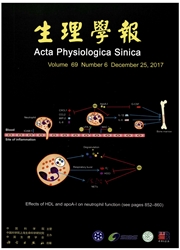

 中文摘要:
中文摘要:
本研究旨在观察臭氧应激不同时间,大鼠肺内血管活性肠肽(vasoactive intestinal peptide,VIP)含量和支气管粘蛋白总量的变化,分析两者之间的相关性。取64只Sprague-Dawley大鼠,臭氧应激不同时间后,用放射免疫方法检测肺组织匀浆VIP含量,过碘酸-希夫(periodic acid-Schiff,PAS)染色检测支气管粘蛋白总量的变化,分析两者之间的相关性。结果显示,呼吸道损伤初期,VIP变化不明显,支气管粘蛋白总量分泌增加,随着损伤加重,引起VIP代偿性分泌增加,支气管粘蛋白总量有所减少。随损伤时间的延长,损伤程度加重,肺内分泌VIP的阳性神经纤维及内分泌细胞数量减少,呼吸道对炎性介质的抗损伤作用下降,支气管粘蛋白总量逐渐增加。以上结果证实在气道高反应过程中,VIP分泌与支气管粘蛋白总量呈负相关。
 英文摘要:
英文摘要:
Vasoactive intestinal peptide (VIP) is a neuropeptide with potent bronchodilator, immunomodulator, and anti-inflammatory properties, and thus has biological properties capable of counteracting all major features of the asthmatic response. However, the effect of VIP on bronchial mucin secretion remains unclear. In order to observe the influence of VIP on bronchial mucin, the present study was designed to observe the correlation between VIP and total bronchial mucin changes under different time of ozone stress in rat lung. Sixty-four Sprague-Dawley rats were used in the experiment. Under different time of ozone stress, VIP content in lung homogenate was analyzed by radioimmunoassay, and changes in total bronchial mucin in the lung were analyzed by calculating the goblet cell hyperplasia ratio and the epithelial cell mucus occupying ratio from the periodic acid-Schiff reaction (PAS) staining. The results showed that, at early stage of respiratory tract injury, VIP did not change significantly, while the total bronchial mucin secretion increased; with the development of damage, the secretion of VIP increased by compensation, followed by a decrease in total bronchial mucin; with further injury, the numbers of pulmonary endocrine VIP positive nerve fibers and endocrine cells decreased, but bronchial mucin volume gradually increased. It is concluded that the secretion of VIP is negatively correlated with the secretion of bronchial mucin during the development of inflammation.
 同期刊论文项目
同期刊论文项目
 同项目期刊论文
同项目期刊论文
 期刊信息
期刊信息
